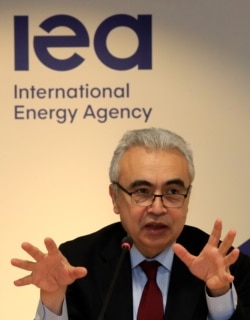Economic lockdowns imposed due to the coronavirus pandemic may spark record cuts in global energy demand and carbon dioxide emissions, according to a new report by the International Energy Agency.
The Paris-based IEA said in a report released Thursday that world energy demand could drop by 6% this year because of stay-at-home orders and other travel restrictions.
The IEA, which advises industrialized nations on energy issues, said the projected 6% drop, seven times the decline after the 2008 world financial crisis, would be the largest on record.
“In absolute terms, the decline is unprecedented — the equivalent of losing the entire energy demand of India, the world’s third largest energy consumer,” the IEA said in a statement.
Business activity throughout much of the world has stalled as coronavirus containment measures continue to weaken the global economy, reinforcing economists’ expectations of a severe global recession.
The report said reduced energy demand would also lead to at least an 8% decline in global carbon dioxide emissions, six times larger than the record 400 million ton drop in 2009 after the global financial crisis.
The report said declines in the use of coal and oil would be largely responsible for the projected declines in energy-related CO2 emissions.
“Resulting from premature deaths and economic trauma around the world, the historic decline in global emissions is absolutely nothing to cheer,” said IEA executive director Dr. Fatih Birol. “And if the aftermath of the 2008 financial crisis is anything to go by, we are likely to soon see a sharp rebound in emissions as economic conditions improve.”
Birol said “governments can learn from that experience by putting clean energy technologies — renewables, efficiency, batteries, hydrogen and carbon capture — at the heart of their plans for economic recovery.”
He said government investments in clean energy “can create jobs, make economies more competitive and steer the world towards a more resilient and cleaner energy future.”
Coal demand has hardest-hit by the pandemic, with demand in the first quarter and projections for the entire year down 8% compared with the same periods last year, the report said.
Global demand for natural gas could drop by about 5% in 2020.
While electricity generation fell by 2.6% in the first quarter, renewable power generation climbed by 3% during the period, as new solar and wind projects became operational.










